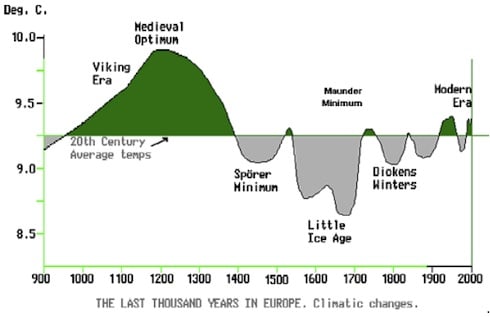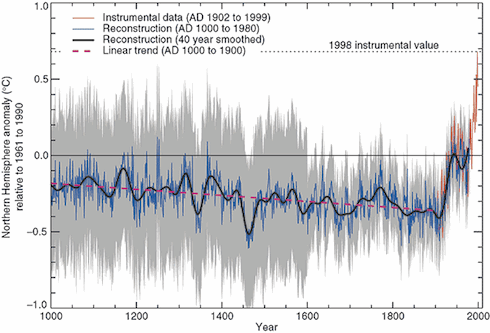Original URL: https://www.theregister.com/2010/07/07/muir_russell_climategate_report/
Climategate report: 'Campaign to win hearts and minds' needed
But what's it mean for the bloke on the bus?
Posted in Science, 7th July 2010 14:43 GMT
The University of East Anglia's enquiry into the conduct of its own staff at its Climatic Research Unit has highlighted criticisms of the department and staff conduct - but clears the path for the individuals concerned to carry on.
The CRU played an important role in writing the UN's IPCC summaries on climate science, so the issue is far from a parochial one. The most serious charge is poor communication; Sir Muir Russell even calls for "a concerted and sustained campaign to win hearts and minds" to restore confidence in the team's work.
Russell was appointed by the institution to investigate an archive of source code and emails that leaked onto the internet last November. The source code is not addressed at all. His report suggests that the problems were of the academics' own making, stating that they were "united in defence against criticism". Yet the enquiry found that despite emails promising to "redefine" the peer review publication process, and put pressure on journal editors, staff were not guilty of subverting the IPCC process, and their "rigour" and "honesty" were beyond question.
Leading academics were called for written and oral evidence before the Russell enquiry, and in many cases the report accepts their account of events. The subjects of their criticism were not invited, not were climate scientists critical of their behaviour. For example, in their capacity as IPCC gatekeepers, the academics are cleared of excluding critical evidence, and yet bending the rules to include supporting studies. To reach this particular conclusion, for example, the report finds a criterion: a "consistence of view" with earlier work. The earlier work here was in fact produced the academics under scrutiny. So, having compared the CRU academics' work against their previous work, and found it to be consistent, they are cleared of malpractice.
Despite the gentlemanly and clubbable tone, the report nevertheless has deep systemic criticism of the institution and the team's processes. UEA "fell badly short of its scientific and public obligations", according to one review panel member, Lancet editor Richard Horton.
It criticises the team's decision to curtail a temperature reconstruction at 1960, and splice on an instrumental temperature record, without explanation, noting:
"The figure supplied for the WMO Report was misleading in not describing that one of the series was truncated post 1960 for the figure, and in not being clear on the fact that proxy and instrumental data were spliced together. We do not find that it is misleading to curtail reconstructions at some point per se, or to splice data."
There's a selective approach to criticism of scientific techniques - officially, Muir Russell says it doesn't examine the validity of scientific arguments. But as you can see, in places, it does. On the issue of the Yamal reconstruction, CRU is cleared but the related issues of basing the reconstruction on a limited sample of proxies, and using techniques which exaggerate and validate outliers (basically, one tree) is not addressed.
FOIA
On compliance with Freedom of Information requests, the inquiry found the CRU team evasive, and "found a tendency to answer the wrong question or to give a partial answer". They also found "a clear incitement to delete e-mails, although we have seen no evidence of any attempt to delete information in respect of a request already made". (Jones had told a US academic that "I think I'll delete the file rather than send to anyone” and requesting deletions from other staff.)
The defensiveness "set the stage", says Russell, for the barrage of FOIA requests last year, but "clear and early action would likely have prevented much subsequent grief". It adds that "CRU helped create the conditions for this campaign by being unhelpful in its earlier responses".
The institution itself had failed to anticipate the new FOIA regime, and let the academics run amok. Strangely it calls for "a concerted and sustained campaign to win hearts and minds" to restore confidence.
On information handling, the report "highlighted significant problems in the areas of: imbalance of authority; lack of effective challenge at appeal; over dependence on single individuals; inadequate escalation processes and limited strategic oversight."
The panel avoided examining the scientific work of the CRU Team - as have the two other reviews of the leaked archive by Lord Oxburgh, and the Commons Select Committee on science. If the academics had used bats' wings or tea leaves to create temperature reconstructions, that wasn't a matter for any of the panels to judge. And this is undoubtedly a shortcoming. The voter is entitled to see the evidence and understand the arguments that may answer the question: "Is this climate thing anything to worry about?"
It's worth taking a step back from the details of Climategate to understand the background to the enquiries. By understanding what the CRU academics do, we can judge how important the criticism of them may be - or not.
What did the CRU crew do?
The Climatic Research Unit is one part of the picture, an important one, but not at the heart of climate theory. They're not physicists, and they don't do the physics upon which competing explanations of how the climate works stand or fall, once measured against observation. So in that sense, 'Climategate' isn't a 'Climategate' - it isn't a Scopes Trial of the global warming theory.
But CRU does two important things that shape our understanding of the present and the past. CRU is one of a small number of bodies that calculates global temperature readings (of where we are today), and is probably the pre-eminent body that performs historical temperature reconstructions, quite literally writing or re-writing history. And its importance is magnified since the leading academics are also lead authors of the UN's IPCC reports - the vast volumes policy makers like to cite as their scientific justification, but rarely read.
In the absence of a strong physics story, this temperature work became hotly contested. The biggest bone of contention is whether modern, post-1850 warming is anomalous. If it is, then the likelihood that we were in strange and uncharted territory is much greater. If it isn't, then consequently, the need for "urgent political action" - involving sweeping changes to industrial policy and social policy - became weaker.
The father of modern climatology, HH Lamb, founded CRU in 1972, and the building the academics work in takes his name. When Lamb contributed to the first IPCC report in 1990 the historical temperature record looked like this.

Lamb's temperature graph, featured in the first IPCC report in 1990
By 2001, it looked like this.

Without the error bars (grey), the Medieval Warm Period disappears Source: IPCC TAR 2001
What Climategate is largely about, then, is whether the academics were justified in making that Medieval Warm Period disappear.
Unfortunately, none of the three 'independent' reviews have grappled with this. The absence of anomalous warming doesn't, as some skeptics say, make the problem go away. But it takes the issue back onto the blackboard, back into realms of the potential threats. It certainly removes much of the impetus for a sweeping and urgent political program of mitigation.
Yet in the academics' own words, we learn that the recent burst of warming, while real, is far from unusual.
One of the leading CRU academics, Keith Briffa, wrote that:
“I know there is pressure to present a nice tidy story as regards ‘apparent unprecedented warming in a thousand years or more in the proxy data’ but in reality the situation is not quite so simple. We don’t have a lot of proxies that come right up to date and those that do (at least a significant number of tree proxies ) some unexpected changes in response that do not match the recent warming. I do not think it wise that this issue be ignored in the chapter...
"For the record, I do believe that the proxy data do show unusually warm conditions in recent decades. I am not sure that this unusual warming is so clear in the summer responsive data. I believe that the recent warmth was probably matched about 1000 years ago.”
In an interview in February, CRU director Phil Jones agrees that recent warming isn't statistically significant, and is matched by previous periods in the instrumental record - such as 1860 to 1880.
The sensible end of the climate debate hinges on how much of a lasting consequence an increase in CO2 has on the climate system. Some prominent scientists who as recently as 2001 were lead authors for the IPCC don't dispute there's an effect, but maintain that once it's worked itself out, the effect is small.
Proponents of large positive CO2 feedbacks have pointed to various 'fingerprints' which are absent, or refuse to manifest themselves. Greenhouse gas warming was supposed to create a telltale warming of the troposphere, but instrumental readings show no such evidence. More recently, they have posited that CO2 must have caused warming, but this is still trapped in the oceans. This "missing heat" has yet to be found, and in the Climategate archive we find US scientist Kevin Trenberth expressing frustration: "The fact is that we can't account for the lack of warming at the moment and it is a travesty that we can't," adding that "we can't definitively explain why surface temperatures have gone down in the last few years. That's a travesty!"
For Trenberth, if we had better instruments, we'd find the heat. For skeptics, the heat might not be there.
By the mid-2000s the issue had become so politicised the academics were acting like a "priesthood", in the words of environmental writer Fred Pearce, no friend of the skeptics. As Jones wrote in an email: “Many of us in the paleo field get requests from skeptics (mainly a guy called Steve McIntyre in Canada) asking us for series. Mike and I are not sending anything, partly because we don't have some of the series he wants, also partly as we've got the data through contacts like you, but mostly because he'll distort and misuse them."
In a sense the CRU team are carrying the can for the physicists' failure to do the science. ®
Andrew warmingly welcomes your comments.